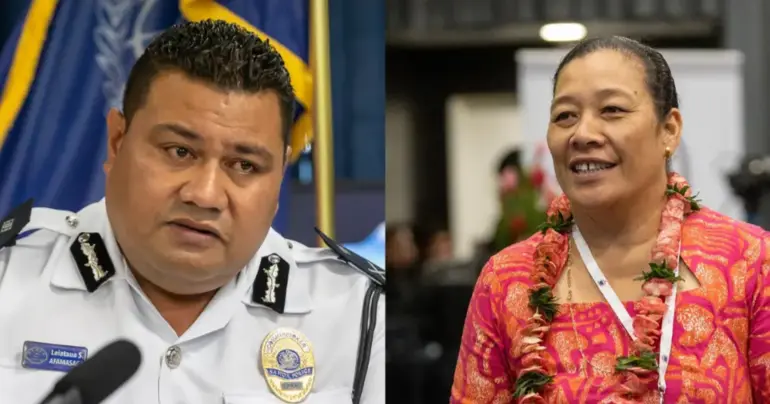Pacific's role as international illicit highway breeding local crime: Interpol Chief
 By Joyetter Feagaimaali'i
•
25 August 2019, 10:00PM
By Joyetter Feagaimaali'i
•
25 August 2019, 10:00PM
The Pacific has become the centre of an international criminal highway and that activity is increasingly driving domestic problems with drugs and crime, the world's most senior police official, Interpol President Kim Jong Yang, has warned.
“There is no doubt that Pacific Islands Countries face a unique set of challenges, caught in the midst of the Pacific highway between major suppliers of illicit goods; large demand hubs; and thousands of miles of coastline to monitor," the former head of South Korea's police force said.
“At the same time, some of the Pacific Islands are seeing the trans-shipment of narcotics through their territories devolve into a growing domestic demand for illicit drugs.”
Speaking to the 48th Pacific Island Chiefs of Police Conference in American Samoa last week, Mr. Kim outlined the unique set of challenges law enforcement officials in the Pacific face.
“The rapidly growing issue of narcotics trafficking across the Pacific, which will be prominent in this event, is another stark reminder that no part of the world is sheltered from the ambitions of crime syndicates," he said.
“The South Pacific is a key region for international law enforcement cooperation.”
Samoa became the 188th member country of the International Criminal Police Organization (commonly known as Interpol) in 2009 and a number of its neighbours have joined the international crime fighting agency.
"I am glad to recognise how much the engagement between agencies in the region and their partners abroad is progressing," he said.
"Over the last two years, three new member countries from the region have joined [Interpol].
"Kiribati, the Solomon Islands and Vanuatu joined the ranks to strengthen our international law enforcement cooperation network, with the overwhelming support of our Member Countries.
"This is a great step forward. Our global community needs the insights from the Pacific.”
He said the voice of the region, the voice of the police overseeing your jurisdictions, carries great value in obtaining a true, global operational picture in our efforts.
In turn, front line officers need a strong communication channel linking countries across the Pacific and the globe, he said.
“Earlier this year, a Syrian national was arrested while attempting to enter the Philippines using a fake Kiribati passport, allegedly sold by a Jordanian national through a syndicate operating from Cambodia.
"While just last week, six people have been arrested in Australia and New Zealand and a record 766kg of M.D.M.A. seized, in connection with a U.K. crime syndicate operating in the Pacific region.”
Mr. Kim said this vividly illustrates that crime knows no borders, and the Ocean is by no means an impenetrable defense against offenders.
"Where opportunities to generate criminal proceeds exist, criminal groups will strive to break into this space, and ultimately, take root," he said.
"And in the process, transferring the technical skillsets developed abroad into the domestic theater.”
He said for drug production processes for the manufacture of methamphetamine and synthetic opioids are regularly seen replicated across regions.
On every continent, criminals are constantly seeking to conduct their operations beyond administrative borders and to exploit perceived vulnerabilities in borders to their advantage.
“No distance is too great,” he said.
President Kim said that no single police force can neutralize such transnational criminal threats without cross-border cooperation.
“In this context, many more connections are waiting to be uncovered using police data generated here, in the Pacific.
“This goes to the heart of Interpol's mission: building bridges between law enforcement agencies across the globe to empower your police forces in tackling common criminal drivers.
“We provide our member countries with a common platform to circulate and search known modi operandi through our growing repository of 'Purple Notices'.
"In the field, the training and operations we coordinate with our member countries help translate this investigative data into tangible outcomes.”
He said the global Lionfish Operation held in September last year with some of the agencies represented at the conference resulted in 1,300 arrests, and seizure of 55 tons of illicit substances.
Another such operation is set to be held in the South Pacific in the coming year.
The P.I.D.C. President announced the creation of a new relief database, which will assist in tracing drug deliveries via common shipments and routes, by matching tool-marks, logos and chemical compositions of drug packages.
“These initiatives form part of the Interpol moidel, designed with one objective in mind: to deliver actionable information to our Member Countries, and assist in interdicting those involved in transnational criminal activities," he said.
He urged Pacific leaders to build solid bridges amongst themselves and the rest of the international police community, particularly in the growing field of data exchange for law enforcement.
“With nearly 100 million police records, Interpol databases are being queried at a rate of almost 300 searches per seconds.
“Pushing this data to the right place at the right time can make the difference between a successful arrest and a missed opportunity.
“This starts by building strong and dynamic exchanges among close neighbors. Your presence here embodies this mindset.”
Mr. Kim said nurturing cooperation across the region, as much as data exchange, was important to the solution.
“One that must be complemented by international information exchange in a region characterized by a large flow of international travelers, and witnessing growing cross-regional trafficking.
“Success in thwarting regional security challenges resides in the national capability to maintain robust flows of police information."
 By Joyetter Feagaimaali'i
•
25 August 2019, 10:00PM
By Joyetter Feagaimaali'i
•
25 August 2019, 10:00PM











